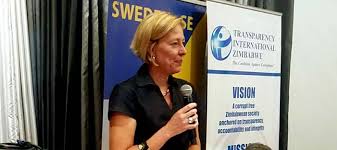By Byron Mutingwende
Corruption is one of the biggest barriers to development hence the vice calls for a holistic approach by stakeholders in addressing it. This emerged at the official launch of the 2015 Annual State of Corruption Report by Transparency International Zimbabwe that was held at The Venue in Avondale on Tuesday 4 October 2016.
Maria Selin, the Head of Development Cooperation and Deputy Head of Mission at the Embassy of Sweden, who was the guest of honour highlighted on the need to fight corruption, especially considering the devastating impact the vice has had on women. Selin said that where countries have made advances in women’s empowerment and gender equality, they have witnessed lower levels of corruption over time.
“Since corruption hits the poor, disadvantaged and vulnerable groups the hardest, women are also likely to bear a heavy burden as they are often marginalised and over-represented among the poorest. According to the UN, an estimated 70 per cent of the world’s poor are women. Whether women are more prone to corruptive behaviour or not is debated…but there is a strong correlation between development and gender equality – and development and low levels of corruption,” Selin said.
It is critical to promote openness and transparency and Sweden believes strongly in a free media where investigative journalism is taken seriously and the protection of sources is sacred. Mary Jane Ncube, the Executive Director of Transparency International Zimbabwe emphasised the importance of addressing systematic corruption from a cultural perspective.
Ncube’s sentiments were in sync with remarks by Selin who said that the fight against corruption was supposed to be spearheaded by leaders with clear moral compasses.
Speaking on the implications of corruption on global and regional politics, trade and integration, Annabel Gerry, the UK Department for International Development in Zimbabwe said that the effects of corruption impact beyond national borders.
“Corruption has a negative effect on both inequality and the provision of basic services, thereby affecting the poor disproportionately. Corruption both directly and indirectly traps the poorest in poverty. That’s why the Sustainable Development Goal Number 16, agreed last year, commits the world to reduce corruption and bribery in all their forms, because it is recognised as one of the biggest barriers to development,” Gerry said.
Some of the symptoms of corruption include the weak separation of the public and private spheres, leading to the appropriation of public resources; and the primacy of patron-client and identity-based relationships over horizontal, transparent and rights-based relationships.
Among the speakers was Daniel Shumba, the Chairperson of the Parliamentary portfolio committee on mines who said that the establishment of functional systems and institutions attracts economic growth. He said that there was the need for political will and commitment to fight corruption, coupled with institutional reforms.
Itai Chirume from MMC Capital, while commenting on the implications of the 2015 Annual State of Corruption Report findings to national investment growth, business and private sector growth, acknowledged the country’s debt overhang and blamed the transfer of the Reserve Bank of Zimbabwe debt liability to all the citizens.
As recommendations to address corruption, there was the need to increase citizen engagement and shape civic opinion on the issue. It emerged that it important to support civil society and media efforts to protect the democratic space and build transparency and social accountability around the use of public resources.
Gerry said that it was important to invest in public financial management and public expenditure tracking and increase transparency on about policy choices.
